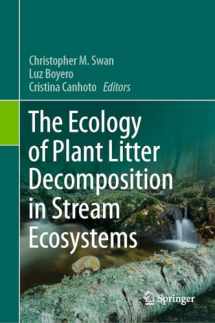
The Ecology of Plant Litter Decomposition in Stream Ecosystems
Book details
Summary
Description
About the Author Christopher Swan is a professor in the Department of Geography and Environmental Systems at the University of Maryland Baltimore County. He is a community ecologist with interests in streams and rivers, in addition to urban ecology. His research projects range from understanding controls on carbon processing in rivers, to mechanisms underscoring biodiversity patterns at multiple spatial scales in both aquatic and terrestrial urban ecosystems, as well as numerous synthesis activities both nationally and internationally.Luz Boyero is a research professor at the University of the Basque Country and the Basque Foundation for Science (Ikerbasque). Her research focuses on how multiple anthropogenic stressors impact the functioning of stream ecosystems, with particular emphasis on how biodiversity loss influences key processes such as plant litter decomposition and nutrient cycling. She coordinates GLoBE, a network of 50+ research teams from all over the world, which join forces to investigate the main patterns and drivers of stream ecosystem functioning at the global scale.Cristina Canhoto is a researcher at the Center for Functional Ecology of the University of Coimbra (CFE-UC) and professor at the Department of Life Sciences, University of Coimbra, Portugal. Over the last 20 years, her work was centered on the functioning of forested streams. She has been mainly focused on the dynamics of litter decomposition and on the physiological and ecological responses of fungal decomposers and leaf consumers in the face of environmental variability and anthropogenic stressors. Product Description With almost 90% of terrestrial plant material entering the detrital pool, the processing of this significant carbon source is a critical ecosystem function to understand. Riverine ecosystems are estimated to receive, process and transport nearly 1.9 Pg of terrestrial carbon per year globally, highlighting the focus many freshwater ecologists have on the factors that explain decomposition rates of senesced plant material. Since Webster and Benfield offered the first comprehensive review of these factors in 1986, there has been an explosion of research addressing key questions about the ecological interactions at play. Ecologists have developed field and laboratory techniques, as well as created global scale collaborations to disentangle the many drivers involved in the decomposition process. This book encapsulates these 30+ years of research, describing the state of knowledge on the ecology of plant litter decomposition in stream ecosystems in 22 chapters written by internationally renowned experts on the subject. From the Back Cover With almost 90% of terrestrial plant material entering the detrital pool, the processing of this significant carbon source is a critical ecosystem function to understand. Riverine ecosystems are estimated to receive, process and transport nearly 1.9 Pg of terrestrial carbon per year globally, highlighting the focus many freshwater ecologists have on the factors that explain decomposition rates of senesced plant material. Since Webster and Benfield offered the first comprehensive review of these factors in 1986, there has been an explosion of research addressing key questions about the ecological interactions at play. Ecologists have developed field and laboratory techniques, as well as created global scale collaborations to disentangle the many drivers involved in the decomposition process. This book encapsulates these 30+ years of research, describing the state of knowledge on the ecology of plant litter decomposition in stream ecosystems in 22 chapters written by internationally renowned experts on the subject.


We would LOVE it if you could help us and other readers by reviewing the book
Book review



